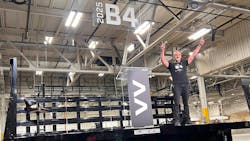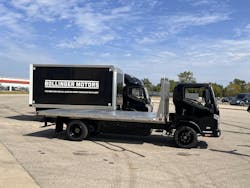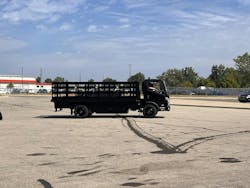Bollinger Motors celebrates the start of production
LIVONIA, Michigan—“Getting to this point is a one-in-a-million f------ chance,” Robert Bollinger, Bollinger Motors’ founder and one of its largest stakeholders, said to a group of employees, press, the Livonia mayor, the Consulate General of Canada, and other guests at Bollinger Motors’ production launch party.
“The odds of us getting to this are so astronomically against us, and we actually did it,” Bollinger said Sept. 20.
The Bollinger Motors B4 is manufactured here at a Roush Industries’ production facility in metro Detroit; Bollinger Motors has a manufacturing contract with Roush in which Roush will eventually assemble Bollinger’s planned lineup of platforms and chassis in Class 3 to 6, Bollinger stated in a press release. It was at this Roush facility where the OEM held the launch party.
The day marked a major milestone for Bollinger. The company has worked to develop an electric vehicle for nearly a decade, beginning with a Class 3 SUV (the B1) and pickup truck (the B2) marketed to consumers before shifting to the commercial vehicle space in 2022.
Within that decade, as the world watched EV startups fold left and right, Bollinger kept on trucking. James Taylor, Bollinger’s CEO, described the EV startup climate like this:
“The carnage that's in this industry is incredible,” Taylor said, addressing the crowd. “All of the players that bit off more than they could chew, ran out of cash, technical issues—it's a disaster. So, the odds of making it here today are—you can't even measure it.”
See also: Bollinger Motors moves from EV startup to production
Leadership, culture, and strategy
Being that one-in-a-million startup to make it to production is a testament that the team is surely proud of. But what sets Bollinger apart that allowed it to get there?
Continuous cash flow helps, as Taylor said in his speech, and Mullen Automotive, who purchased a controlling interest in Bollinger Motors back in 2022, has played a large role in that. But perhaps it’s culture and good leadership that also helped Bollinger Motors defy the odds.
Upon Mullen’s purchase, Taylor detailed how Robert Bollinger graciously relinquished his title as CEO in the name of Bollinger Motors’ success—but not before ensuring the culture he built at Bollinger Motors remained intact.
“[Robert] was very clear on the culture that's been created here and how important that was, and how important it was to maintain that culture,” Taylor explained. “And of course, also Robert's vision, himself, of not just this vehicle but the rest of the vehicles and the kind of company that he wanted to grow.”
See also: The road to becoming an OEM
Then there’s also Bollinger Motors’ team. Taylor himself has decades of experience in the automotive and EV industries, working with brands such as Hummer, Cadillac, Electric Last-Mile Solutions, and Workhorse, to name a few. Bollinger Motors’ president and COO Bryan Chambers has more than 35 years in the industry, working as a consultant with his own firm among other automotive positions. The remainder of the Bollinger Motors team is filled with individuals who have lived and breathed trucks and automotive for decades and even their whole careers.
Finally, the company shifted its focus. After developing the B1 and B2, aimed at consumers, Bollinger decided to develop a commercial vehicle and focus only on that product. The timing of that shift couldn’t have been better. A 2024 McKinsey and Company survey reported that, worldwide, nearly 30% of current EV owners will consider “switching back” to an internal combustion engine vehicle in the future. In the U.S., that number is higher at 46%.
On the commercial and fleet side, however, the sentiment is much more positive. According to research conducted by Cox Automotive in Q1 2024, a staggering 90% of fleet owners that have EVs in operation report a likelihood of acquiring more EVs in the next acquisition cycle. Of the total respondents, including those who operate EVs in their fleet and those who don’t, 87% believe EVs will be added to their fleets within the next five years.
See also: Despite challenges, heavy-duty EVs are improving
Whether it’s the leadership, the culture, or the strategic business moves that have gotten Bollinger Motors to production, it’s working and at “high speed,” as Taylor noted.
While the Bollinger excitement at the launch event was tangible, time will tell if the company, now officially an OEM, will become a successful one.
About the Author
Jade Brasher
Senior Editor Jade Brasher has covered vocational trucking and fleets since 2018. A graduate of The University of Alabama with a degree in journalism, Jade enjoys telling stories about the people behind the wheel and the intricate processes of the ever-evolving trucking industry.



